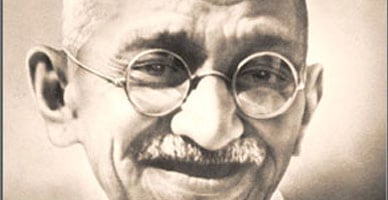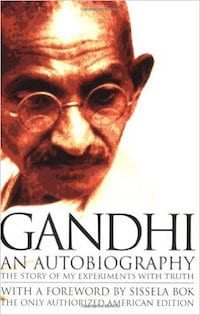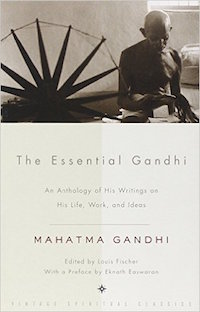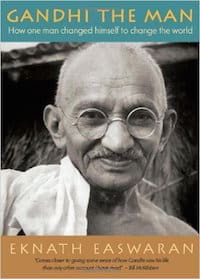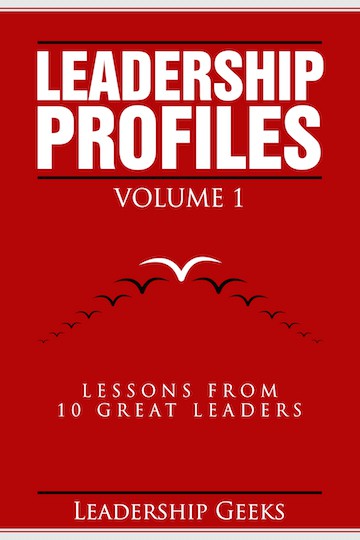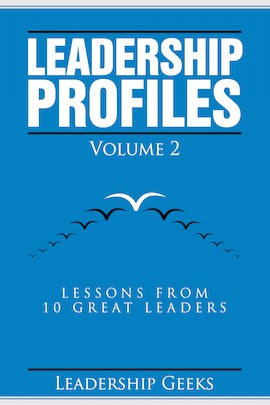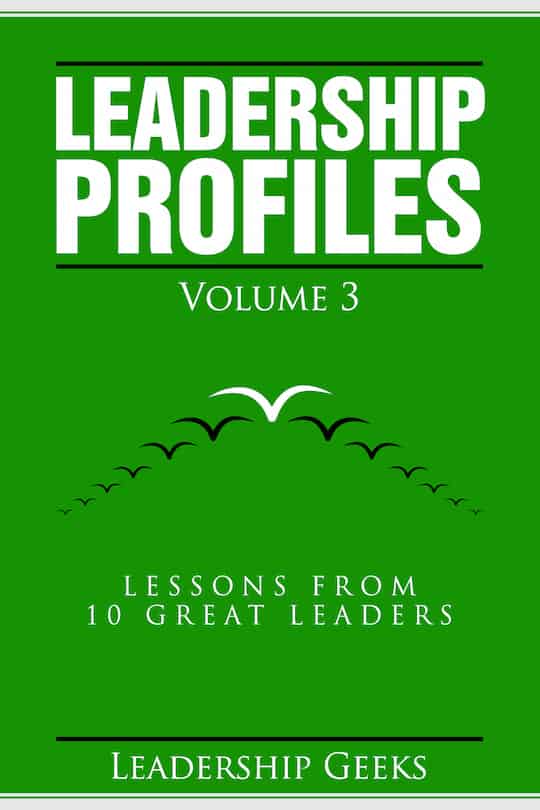Mahatma Gandhi was a political and spiritual leader of India. He helped India gain its independence and is honored in India as the ‘Father of the Nation’. Gandhi was an advocate of nonviolence and was the first to employ non-violent tactics in the political arena on a large scale. His life inspired others like Martin Luther King Jr to employ non-violence in fighting for civil rights.
A Short Biography
Mohandas Gandhi was born on October 2nd, 1869. His father was chief minister in the Porbandar state in the Indian Empire. As a young boy he read many Hindu Scriptures and Indian Classics, and this gave him a foundation for his work in later years.
Due to the customs of the region at that time, at age 13 he was married to a 14-year-old girl. After suffering a miscarriage, they went on to have four sons.
In 1888, Gandhi traveled to London and studied law in University College London and was trained as a barrister. He wanted to establish a law practice in London but failed. Instead he accepted a job from an Indian firm in South Africa.
In South Africa, he witnessed and experienced racial discrimination. This led him into politics as he fought for the rights of Indians in South Africa. It was in South Africa that he earned the honorific ‘Mahatma’ which means “high-souled” or “venerable” in Sanskrit.
In 1915, when he returned to India, Gandhi entered politics and began speaking at the National Indian Congress. He spoke out against certain British policies that discriminated against Indians. He was arrested a few times in his life, but his first arrest caused a mass protest outside the jail, forcing the judge to let him go.
Gandhi employed non-cooperation, non-violence and peaceful resistance as his “weapons” in the struggle against the British.
His most famous protest was the Salt March. To protest against the British monopoly of salt, he organized a 388-kilometer march to the sea at Dandi, Gujarat to make salt himself. This campaign was successful and the colonial government decided to negotiate with Gandhi.
World War II intensified India’s desire and demand for independence. India was eventually partitioned along religious lines and Pakistan was created. The division of India sorely upset Gandhi who believed in religious unity.
Gandhi was assassinated in 1948, a loss that was mourned deeply by his country.
Awards and Honours
Gandhi would be awarded many honors after his death. These included:
- His birthday would be declared the “International Day of Non-Violence”
- The day of his death would be declared “Martyr’s Day” in India
- Time Magazine named Gandhi “Man of the Year” in 1930
- Runner up to Person of the Century in 1999
And many more.
Leadership Lessons from Gandhi
1. Constant growth is a part of life
Gandhi understood the importance of personal growth in his life. Despite being an accomplished leader in his community, Gandhi always sought out greater understanding through study of religious scripture. He once said, “Constant development is the law of life; and a man who always tries to maintain his dogmas in order to appear consistent drives himself into a false position.”
Gandhi also believed that we had to be the change we want to see in the world. If we want to have a positive impact on the world, we have to first develop positive those qualities in ourselves — good habits, discipline, humility etc.
Constant growth is important for a leader. Remain open to learning and improving yourself. Develop your skills. Your effectiveness as a leader depends on your ability to grow alongside your team and your organization. What have you done lately in order to become a better leader?
2. The power of influence and persuasion
In the fight for independence against the British, Gandhi knew that if they fought using conventional means, they would not win. Instead, he decided that adopting a nonviolent approach would be much more effective. Against the mighty British, tactics such as fasting, hunger marches and political rhetoric became weapons as Gandhi used the power of influence and persuasion to win the support of Indian people across the country.
As a leader, using influence and persuasion is much more effective than brute forcein convincing people to follow you with their hearts. This involves the clear articulation of your vision, the ability to motivate and inspire, and the courage to lead from the front during tough times. Get your team to believe in you and your vision, and they will stick with you through the difficult path to reaching your goals.
3. The Importance of saying ‘No’
Gandhi famously said “A ‘No’ uttered from the deepest conviction is better than a ‘Yes’ merely uttered to please, or worse, to avoid trouble.” He demonstrated his resolve to this principle throughout his life, with adhering to his principles of nonviolent protest. Notably, when he served as leader of the Indian National Congress Party, he refused to participate in, or condone the violence committed by other party members.
In your own leadership journey, you may sometimes have to make unpopular decisions or say ‘no’ to your supporters for the greater good of the organization. And while it’s tempting to give in and be a people pleaser, the real test of a leader is when he does what he believes is right despite criticism or pressure to do otherwise.
Books about Gandhi
Gandhi: An Autobiography – The Story of My Experiments With Truth
The man whose words of silence and peace echoed louder than any shouts of violence or screams of rebellion, Gandhi showed to the world a message that keeps on inspiring. In this book, the biggest proponent of nonviolent resistance retells the story of his life in his own writing.
The Essential Gandhi: An Anthology of His Writings on His Life, Work, and Ideas
Peer into the mind of one of the most iconic spiritual figures of our times. See the world through the eyes of Gandhi, the revolutionary leader who dared to challenge all notions of truth, politics, love, spirituality and much more.
Gandhi the Man: How One Man Changed Himself to Change the World
Explore the turning points and crucial moments in Gandhi’s life that led him to become the “great soul”. Written by Eknath Easwaran who grew up in Gandhi’s India, this book truly conveys the effects and influence of Gandhi’s teachings and views.
Quotes from Gandhi
An ounce of practice is worth more than tons of preaching.
Constant development is the law of life, and a man who always tries to maintain his dogmas in order to appear consistent drives himself into a false position.
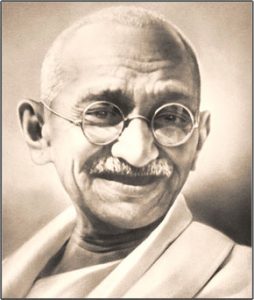
Increase of material comforts, it may be generally laid down, does not in any way whatsoever conduce to moral growth.
Interdependence is and ought to be as much the ideal of man as self-sufficiency. Man is a social being.
That service is the noblest which is rendered for its own sake.
It is any day better to stand erect with a broken and bandaged head then to crawl on one’s belly, in order to be able to save one’s head.
A man is but the product of his thoughts what he thinks, he becomes.
It is my own firm belief that the strength of the soul grows in proportion as you subdue the flesh.
It is unwise to be too sure of one’s own wisdom. It is healthy to be reminded that the strongest might weaken and the wisest might err.
Live as if you were to die tomorrow. Learn as if you were to live forever.
Man becomes great exactly in the degree in which he works for the welfare of his fellow-men.
Man can never be a woman’s equal in the spirit of selfless service with which nature has endowed her.
There is more to life than increasing its speed.
To believe in something, and not to live it, is dishonest.
As human beings, our greatness lies not so much in being able to remake the world – that is the myth of the atomic age – as in being able to remake ourselves.
Be the change that you want to see in the world.
Glory lies in the attempt to reach one’s goal and not in reaching it.
Happiness is when what you think, what you say, and what you do are in harmony.
Man falls from the pursuit of the ideal of plan living and high thinking the moment he wants to multiply his daily wants. Man’s happiness really lies in contentment.
Man should forget his anger before he lies down to sleep.
Always aim at complete harmony of thought and word and deed. Always aim at purifying your thoughts and everything will be well.
An eye for an eye only ends up making the whole world blind.
If patience is worth anything, it must endure to the end of time. And a living faith will last in the midst of the blackest storm.
Imitation is the sincerest flattery.
In a gentle way, you can shake the world.
My life is my message.
Satisfaction lies in the effort, not in the attainment, full effort is full victory.
Service which is rendered without joy helps neither the servant nor the served. But all other pleasures and possessions pale into nothingness before service which is rendered in a spirit of joy.
Strength does not come from physical capacity. It comes from an indomitable will.
The main purpose of life is to live rightly, think rightly, act rightly. The soul must languish when we give all our thought to the body.
The weak can never forgive. Forgiveness is the attribute of the strong.
Healthy discontent is the prelude to progress.
I claim to be a simple individual liable to err like any other fellow mortal. I own, however, that I have humility enough to confess my errors and to retrace my steps.
I look only to the good qualities of men. Not being faultless myself, I won’t presume to probe into the faults of others.
I suppose leadership at one time meant muscles; but today it means getting along with people.
If I had no sense of humor, I would long ago have committed suicide.
A ‘No’ uttered from the deepest conviction is better than a ‘Yes’ merely uttered to please, or worse, to avoid trouble.
A coward is incapable of exhibiting love; it is the prerogative of the brave.
The best way to find yourself is to lose yourself in the service of others.
The difference between what we do and what we are capable of doing would suffice to solve most of the world’s problem.
The human voice can never reach the distance that is covered by the still small voice of conscience.
The law of sacrifice is uniform throughout the world. To be effective it demands the sacrifice of the bravest and the most spotless.
A nation’s culture resides in the hearts and in the soul of its people.
A small body of determined spirits fired by an unquenchable faith in their mission can alter the course of history.
Action expresses priorities.
In prayer it is better to have a heart without words than words without a heart.
You can chain me, you can torture me, you can even destroy this body, but you will never imprison my mind.
You must not lose faith in humanity. Humanity is an ocean; if a few drops of the ocean are dirty, the ocean does not become dirty.
Gandhi Leadership Video
Other Links
Wikipedia: A highly detailed account of Gandhi’s life
mkgandhi.org: The Official Site for Gandhi
More Spiritual Leader Profiles
For leadership profiles of other famous Spiritual leaders, including Jesus, Buddha, and Mahatma Gandhi, check out our Spiritual Leadership Profiles section.
Also check out our Leadership Profiles book series. In each book, we study 10 influential leaders in Business, Military, Politics and Sports.

